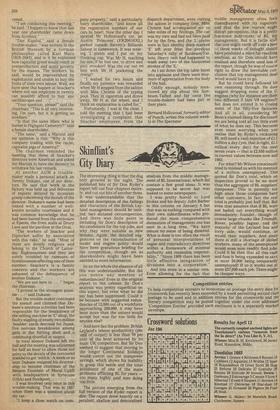Skinflint's City Diary
The interesting thing is that the dog only growled in the night. The published bits of Sir Don Ryder's report left out four chapters entirely, and cut out bits of another three. It was understandable that the detailed description of the failings and characters of the British Leyland management should be omit. ted: tact dictated circumspection. And there was little point in including Sir Don's description of his candidates for the top jobs, and why they were suitable as new brooms. Again, the detailed suggestions on the rationalisation of model and engine policy would have been gratuitous briefing for the competition, though we as shareholders might have been entitled to more information.
So on the whole the absence of all this was understandable. But did you notice any mention of redundancies? Even in the original report to the cabinet Sir Don's analysis was pretty superficial on this aspect, but even what he did say has been suppressed. Could it be because with suggested redundancies of 12,000 out of a workforce approaching 200,000, it may have been more than the unions would accept but was far too little for anyone else?
And here lies the problem. British Leyland's labour productivity (per unit of output) is less than 70 per cent of the level achieved by its main UK competitors. But Sir Don seemed to suggest that moving to the longer Continental holidays would cancel out the manpower savings, which shows his inability to grasp this nettle and the total avoidance of one of the main problems afflicting BL for years — too many highly paid men doing too little.
The picture emerging from the, full version of the Ryder report is dire. The report drew heavily on a petulant, shallow and demoralised analysis from the middle management of BL International, which did contain a few good ideas. It was supposed to be secret but was leaked to some newspapers.
I was pretty horrid to Lord Stokes and his deputy John Barber in this column on January 4 but that was as nothing compared with their own subordinates who produced the most comprehensive damnation of management one has seen in a long time. "We have almost no sense of being directed. What is done is too often the result of personal interpretations of vague and contradictory directives within a framework of minimal authority and ostensible responsibility." "Since 1969 there has been little effective integration of divisions into a corporation."
And lots more in a similar vein. Even allowing for the fact that middle management often feels disenchanted with its superiors, and that the low morale might distort perceptions, this is a prettY fearsome indictment of BL top management. But it is facile stuff that one might rattle off over a beer — three weeks of thought should have produced a more far-reaching analysis, as Sir Don should have realised and therefore used less of the report, though he was of course right to draw the inevitable conclusion that top management dead wood would have to go.
But he could have followed his own reasoning through. He does suggest dropping some of the 11 engines (why for instance are there two different 3 litre V8 engines?) but does not extend it to closing some of the fifty-five factories. And all in all, considering Mr Benn's claimed liking for disclosure we are being told all too little even of what he does say. This becomes even more worrying when you realise that by Ryder's reckoning BL will need a cash injection of £1.1 million a day (yes, that is right, £1.1 million every day) for the next seven years — that is E2,850 million in current values between now and 1982.
For what? Mr Wilson consciously tried to mislead us with his mention of a million unemployed. This quoted Sir Don's total, which on inspection proved to be no more than the aggregate of BL suppliers' manpower. This is patently too high since those companies have other customers. In fact the real total is probably just half that. But even that assumes that if BL were not bailed out everything would immediately founder, though of course large chunks like Triumph, Rover, possibly Jaguar, and the majority of the Leyland bus and lorry side, would continue, as would their suppliers. And since there is still a shortage of skilled workers, many of the unemployed would even now readily find jobs. Could it be then that all this cash and fuss is being expended to save, at most 50,000 being temporarily unemployed? If so it works out at some £57,000 each job. There might be cheaper ways.


































 Previous page
Previous page